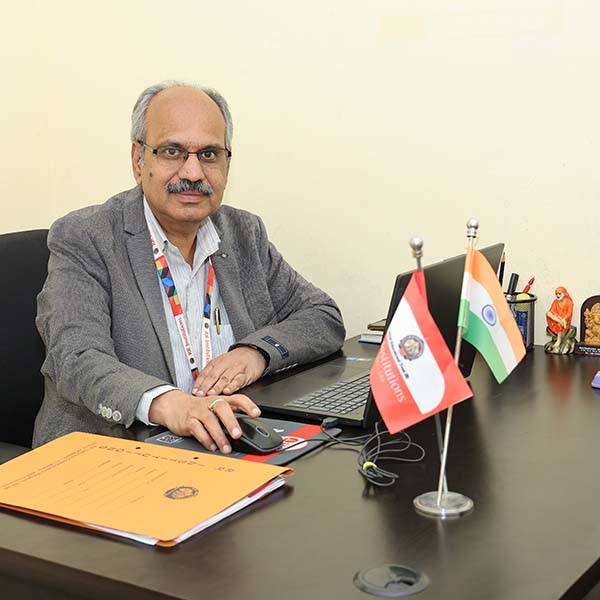VISION
- To become a premier department by producing technically competent Civil Engineers who can meet the needs of Industry, Society and Environment.
MISSION
- M1 : To reinforce Technical skills set among students through innovative teaching learning process, industrial visits and project work
- M2 : To develop competent, ethically strong, environmentally and socially responsible civil engineers.
- M3 : To develop industry institute relationship to promote technical training, consultancy, research and development among faculty and students.
HOD MESSAGE
Dr Harinath S,
BE, ME, PhD.
Mail ID: civil@rrit.ac.in
I welcome you and your interest to know about the objectives, functions, students and faculty of Department of Civil Engineering, RRIT. We offer 4 year B.E. program for regular students and 3 year program for lateral entry students. We are very proud to say that our program is able to attract a large number of students from various states in India and from other countries as well. Our academic curriculum is designed in such a way that its main thrust is on imparting strong fundamentals in scientific, engineering and mathematical knowledge to the students. It tries to bring out the analytical, problem solving, innovative, designing and comprehensive skills in the students. It prepares the students to face the challenges of real world either as an employee or academician or researcher or entrepreneur etc depending on their interests. We offer a wide variety of elective subjects to students and leave the choice completely to them to study the topics which they like.
FACULTY PROFILE
| SL.NO. |
Name of the faculty |
Designation |
Qualification |
| 1 |
RAMEGOWDA H |
PROFESSOR |
Ph.D |
| 2 |
KUMAR R RAO |
PROFESSOR |
Ph.D |
| 3 |
JAGADEESHA KUMAR B G |
PROFESSOR |
Ph.D |
| 4 |
GULLAPALLI SANKARA |
PROFESSOR |
Ph.D |
| 5 |
HARINATH S |
PROFESSOR |
Ph.D |
| 6 |
GUNASHEELA P |
ASST PROFESSOR |
M.Tech |
| 7 |
PRASEEDA E |
ASSOCIATE PROFESSOR |
Ph.D |
| 8 |
RANGANATHAN B A |
ASSOCIATE PROFESSOR |
M.Tech |
| 9 |
PRIYADARSHINI H P |
ASST PROFESSOR |
M.Tech |
| 10 |
B R SHILPA |
ASST PROFESSOR |
M.Tech |
| 11 |
AISWARYA V KAKADE |
ASST PROFESSOR |
M.Tech |
| 12 |
MEENAKSHI K S |
ASST PROFESSOR |
M.Tech |
| 13 |
SAVITHA A L |
ASST PROFESSOR |
Ph.D |
| 14 |
RAGHU K |
ASST PROFESSOR |
Ph.D |
| 15 |
SHINI SHANMUGHAN |
ASST PROFESSOR |
M.Tech |
| 16 |
LAVANYA C N |
ASST PROFESSOR |
M.Tech |
UG-Program
B.E. Civil Engineering
- Course Duration: 4 Years after PUC (8 Semesters).
- 3 Years after Diploma (Lateral entry-6 Semesters).
Course Outcomes
The course outcomes are designed to equip students with a strong foundation in engineering principles, technical knowledge, and practical skills. Graduates are expected to demonstrate the ability to apply mathematical, scientific, and engineering concepts to solve complex problems. They will also be proficient in using modern tools and technologies relevant to their discipline. Effective communication, teamwork, ethical responsibility, and commitment to lifelong learning are key attributes fostered throughout the program. Ultimately, these outcomes prepare students to contribute effectively to professional engineering roles or pursue higher studies and research.
Program Educational Objectives ( PEO’s )
The Program Educational Objectives (PEOs) describe the long-term achievements that graduates are expected to attain within a few years of completing the program. These objectives focus on preparing graduates to establish successful careers in engineering and related fields by applying their technical knowledge, problem-solving abilities, and professional skills. Graduates are expected to demonstrate leadership, adaptability, and a commitment to ethical practices while contributing effectively to multidisciplinary teams. The PEOs also emphasize the importance of lifelong learning, encouraging graduates to pursue advanced studies, research, or professional development to stay current with evolving technologies and global challenges.
| Sl. No. |
Program Educational Objectives ( PEO’s ) |
| PEO 01. |
The graduate will be able to carry out site investigations and to find solutions for emerging problems with technical feasibility in construction projects considering environment and economic aspects.
|
| PEO 02. |
The graduate will be able to develop the ability to learn, understand and implement latest techniques, software tools, materials and equipment in projects for the benefit of society
|
| PEO 03. |
The graduate will be able to carry out leadership and business skills to implement projects at state and national level to generate employment and wealth to the nation.
|
Program Outcomes (PO’s)
The program outcomes reflect the competencies that graduates are expected to attain by the time they complete the degree. These outcomes include the ability to apply knowledge of mathematics, science, and engineering to identify, formulate, and solve real-world problems. Graduates are trained to design and conduct experiments, analyze and interpret data, and develop engineering solutions that are socially responsible and environmentally sustainable. They are also expected to demonstrate strong communication and teamwork skills, understand professional and ethical responsibilities, and recognize the need for continuous learning in a rapidly evolving technological landscape. These outcomes ensure that engineering graduates are well-prepared for successful careers in industry, academia, or entrepreneurship.
| Sl. No. |
Program Outcomes (PO’s) |
| PO 01. |
Engineering knowledge: Apply the knowledge of mathematics, science, engineering fundamentals, and an engineering specialization to the solution of complex engineering problems.
|
| PO 02. |
Problem analysis: Identify, formulate, review research literature, and analyze complex engineering problems reaching substantiated conclusions using first principles of mathematics, natural sciences, and engineering sciences. |
| PO 03. |
Design/development of solutions: Design solutions for complex engineering problems and design system components or processes that meet the specified needs with appropriate consideration for the public health and safety, and the cultural, societal, and environmental considerations.
|
| PO 04. |
Conduct investigations of complex problems: Use research-based knowledge and research methods including design of experiments, analysis and interpretation of data, and synthesis of the information to provide valid conclusions
|
| PO 05. |
Modern tool usage: Create, select, and apply appropriate techniques, resources, and modern engineering and IT tools including prediction and modeling to complex engineering activities with an understanding of the limitations.
|
| PO 06. |
The engineer and society: Apply reasoning informed by the contextual knowledge to assess societal, health, safety, legal and cultural issues and the consequent responsibilities relevant to the professional engineering practice.
|
| PO 07. |
Environment and sustainability: Understand the impact of the professional engineering solutions in societal and environmental contexts, and demonstrate the knowledge of, and need for sustainable development.
|
| PO 08. |
Ethics: Apply ethical principles and commit to professional ethics and responsibilities and norms of the engineering practice..
|
| PO 09. |
Individual and team work: Function effectively as an individual, and as a member or leader in diverse teams, and in multidisciplinary settings.
|
| PO 10. |
Communication: Communicate effectively on complex engineering activities with the engineering community and with society at large, such as, being able to comprehend and write effective reports and design documentation, make effective presentations, and give and receive clear instructions.
|
| PO 11. |
Project management and finance: Demonstrate knowledge and understanding of the engineering and management principles and apply these to one’s own work, as a member and leader in a team, to manage projects and in multidisciplinary environments.
|
| PO 12. |
Life-long learning: Recognize the need for, and have the preparation and ability to engage in independent and life-long learning in the broadest context of technological change..
|
Program Specific Outcomes (PSO’s)
Program Specific Outcomes (PSOs) are the statements that define the specialized knowledge and skills that graduates of a particular engineering branch are expected to acquire by the end of the program. These outcomes are tailored to each discipline and highlight the core competencies and technical expertise relevant to that field. For example, in Computer Science Engineering, PSOs may include the ability to design and develop software applications, apply algorithms and data structures effectively, and utilize modern computing tools. In Mechanical Engineering, PSOs might focus on the design and analysis of mechanical systems, thermal engineering, and manufacturing processes. Overall, PSOs ensure that graduates are well-equipped to meet the specific demands of their chosen engineering domain and contribute effectively in their professional careers.
| Sl. No. |
Program Specific Outcomes (PSO’s) |
| PSO 01. |
Will have the ability to communicate, visualize, design, analyse and estimate in civil engineering projects to meet societal requirements.
|
| PSO 02. |
Will be able to demonstrate professional integrity, an appreciation of ethical, environmental, regulatory issues related to civil engineering projects |
| PSO 03. |
Will be capable to test, evaluate suitability of soil, water, cement, steel and other construction materials. |


